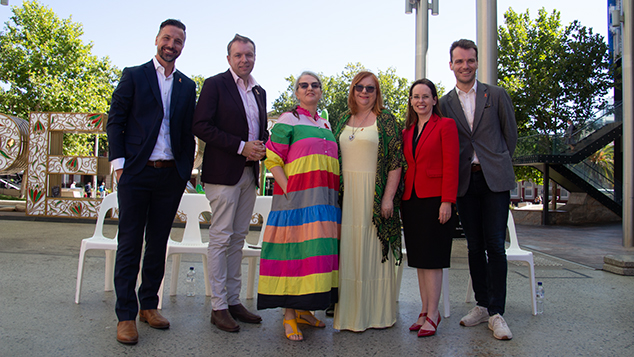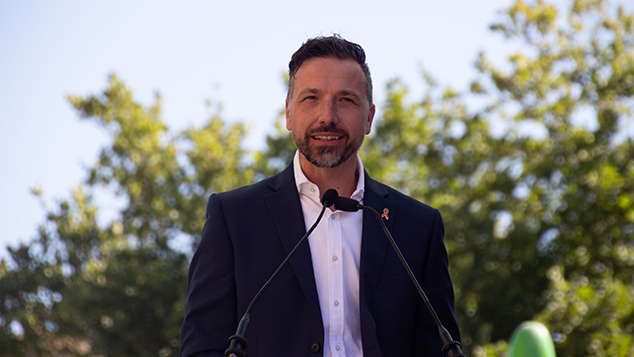
Perth’s World AIDS Day breakfast hosted by WAAC has heard calls to end the criminalisation of HIV, make treatments more accessible to everyone, and a renewed effort to combat stigma and discrimination.
WAAC, formerly the WA AIDS Council, held a breakfast gathering in Forrest Chase to make the occasion and presented a range of speakers who spoke about their experiences of living with HIV, as well as presenting a plan for the future.

Dr Daniel Vujcich, who joined WAAC as their new CEO earlier this week took the opportunity to acknowledge the many decades of work community members have put into tackling HIV over the last four decades, while also calling for law makers to catch up with the realities of HIV today.
Dr Vujcich acknowledge the work of the Campaign Against Moral Persecution (CAMP) and the Gay Activity Group (GAGS) who were two of the community groups whose early work led to the formation of the WA AIDS Council.
WAAC’s new leader highlighted that the issues around HIV are always changing and today the organisation needs to ensure it caters to an ageing group of people living with HIV, while also addressing the areas where eliminating new transitions is more challenging.
“We are on track to being one of the first places in the world to achieve virtual elimination of HIV, but this doesn’t mean that the legacy of those brave community efforts can just be reduced to a genteel annual breakfast.
“Instead, I think we must always gather here to think about what still needs to be done out there.” Dr Vujcich said.
“Around half of people living with HIV in Australia are over the age of fifty. To have the community aging with HIV warrants celebration, but it also merits considered action to address the new challenges.
“These challenges include increasing comorbidities, lack of social supports, and encounters with an aged care sector that’s unaccustomed to dealing with HIV.” Dr Vujcich said.
The health leader also highlighted the need for urgent law reform of both the state’s Equal Opportunity legislation, but also the long-delayed removal of the Gender Reassignment Board.
“Today, as we remember, our discriminatory laws and policies have impacted on people living with HIV. We’re also called to stand in solidarity with trans people living in our community, whose demands for dignity are not being met.” Dr Vujcich said.
In an opinion piece published in The West Australian on Thursday Dr Vujcich highlighted the state’s controversial laws about mandatory testing as legislation that was based on outdated science.
“Most of us now know that it is safe to eat with, work with, kiss, and hold the hand of a person living with HIV. We are learning to treat people with HIV in the same way that we treat any of the other 12 million Australians living with a chronic condition — with kindness, compassion and respect.
“Yet, many of our laws and public policies continue to lag behind both science and community sentiment. In 2014, the State Government introduced laws which enable people who spit at police officers to be involuntarily tested for HIV. These same laws were amended in 2020 to enable people to be tested for COVID-19.
“We don’t disagree with the premise that spitting is a degrading act and that police officers have a right to safe workplaces. Dignity is important.
“Our issue with the law relates to the fact that it perpetuates an outdated and scientifically disproven myth that HIV can be transmitted through contact with saliva. Myths such as these create a climate for stigma and discrimination to thrive and resurface in our community. Our laws should show lead us forward, not drag us back.” Dr Vujcich said.
The WAAC CEO noted that last year the epartment of Health’s Communicable Disease Control Directorate released guidelines around the mandatory testing laws. Those guidelines acknowledge that the risk of HIV transfer associated with spitting is zero.
Dr Vujcich asked if the government was now accepting the science that there was no HIV risk, why were the laws remaining in place?
When the laws were introduced in 2015 by the Barnett government it was claimed that they would rarely be used, but in the years after the laws were implemented it was shown that they were activated on a regular basis.
At the time of their implementation health experts stressed that there was no scientific basis to the legislation. In 2020 the McGowan government expanded the legislation to cover people in prison, again ignoring medical expert’s objections.

People still face stigma about HIV within the medical system
Guest speaker Angela Hellewell spoke about her experience of living with the chronic illness of diabetes, and her experience of living with HIV for many decades.
She shared that while both are manageable conditions, HIV still sees her encounter discrimination and stigma regularly – especially within the medical field.
“I talk about both freely, but I don’t always get the same reaction, support or interest.” Hellewell shared. “I’m over 60, and I was diagnosed with HIV in 1990. I was diagnosed with diabetes in the last five years. One I struggled to manage, and it impacts my life in many, many ways. The other I don’t even think about it often.”
Hellewell shared that she has found it challenging to find a doctor who can assist her with both conditions, but it was HIV that many medical professionals were still lacking knowledge about.
“After visiting several GP practices, and getting that fabulous feeling in your stomach, that this is not a safe place, a feeling well-honed over many years of discrimination, I still haven’t found a local GP or health practitioner that I could discuss health issues with, and most of them I chose never to go back to again.” she shared.

Senator Louise Pratt says state laws need to be updated
Senator Louise Pratt, who has served on the federal government’s recent HIV Taskforce, spoke about how the new plan for tackling the virus in Australia will address the real challenges of HIV today.
Senator Pratt said it was essential that the message of ‘Undetectable Equals Untransmissible’ is spread far a wide to combat the stigma surrounding the virus.
Senator Pratt said it was essential that people were encouraged to test regularly for HIV so new transmissions of the virus were quickly identified, allowing people to get treatment as soon as possible, but criticised the Western Australian state laws that require people to disclose their HIV status.
“We are going to have a lot of work to do at home in Australia to continue to virtually eliminate the transmission of HIV here as well, because we do still have discriminatory laws on our books here in the state of Western Australia.
“If you’ve got ‘undetectable equals untransmissible’, why do you have disclosure laws for your HIV status that require you to disclose it to sexual partners? It creates, frankly an incentive to not get tested, because if you don’t know – you have no legal obligation to disclose.”
Senator Pratt said the federal government’s new strategy for ensuring the elimination of community transmission of HIV that was launched yesterday by Health Minister Mark Butler calls on the states to undertake the required law reform.
“These are the kinds of things that the strategy that Mark Butler has endorsed, call our attention to for nationwide reform. To be a leader in the region, we’ve got a lot of work to lead our communities here to continue to fight to ensure that people with HIV positive happy lives where they can be treated.”
Senator Pratt also said it was essential that all people in Australia were able to access treatment for HIV regardless of their visa status, and a person’s status should not be a factor in determining their suitability as a resident or citizen.
“Why would you ask for an HIV test? If you’ve got no prospect of accessing, accessing the medication that you need in order to treat it? Why would you get a HIV test if you think it’s going to affect your capacity to apply for a visa to stay in Western Australia?” Senator Pratt said.
Senator Pratt said the Albanese government would be committed to looking out ensuring stigma and discrimination did not occur within the Medicare system, or Australia’s migration system.
Graeme Watson
You can support our work by subscribing to our Patreon
or contributing to our GoFundMe campaign.





